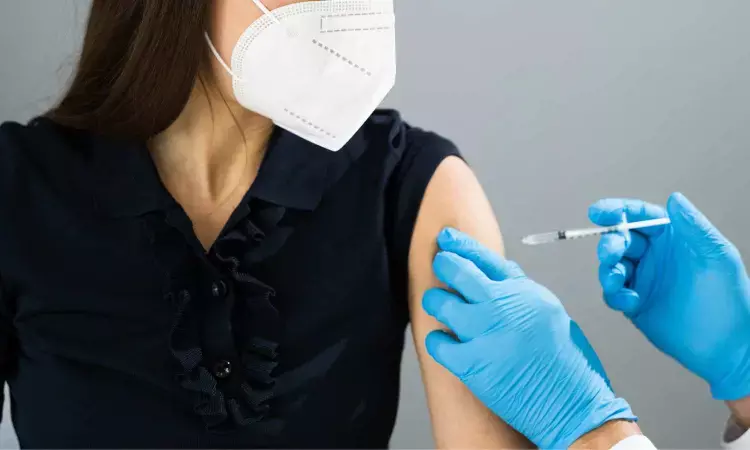- Home
- Medical news & Guidelines
- Anesthesiology
- Cardiology and CTVS
- Critical Care
- Dentistry
- Dermatology
- Diabetes and Endocrinology
- ENT
- Gastroenterology
- Medicine
- Nephrology
- Neurology
- Obstretics-Gynaecology
- Oncology
- Ophthalmology
- Orthopaedics
- Pediatrics-Neonatology
- Psychiatry
- Pulmonology
- Radiology
- Surgery
- Urology
- Laboratory Medicine
- Diet
- Nursing
- Paramedical
- Physiotherapy
- Health news
- Fact Check
- Bone Health Fact Check
- Brain Health Fact Check
- Cancer Related Fact Check
- Child Care Fact Check
- Dental and oral health fact check
- Diabetes and metabolic health fact check
- Diet and Nutrition Fact Check
- Eye and ENT Care Fact Check
- Fitness fact check
- Gut health fact check
- Heart health fact check
- Kidney health fact check
- Medical education fact check
- Men's health fact check
- Respiratory fact check
- Skin and hair care fact check
- Vaccine and Immunization fact check
- Women's health fact check
- AYUSH
- State News
- Andaman and Nicobar Islands
- Andhra Pradesh
- Arunachal Pradesh
- Assam
- Bihar
- Chandigarh
- Chattisgarh
- Dadra and Nagar Haveli
- Daman and Diu
- Delhi
- Goa
- Gujarat
- Haryana
- Himachal Pradesh
- Jammu & Kashmir
- Jharkhand
- Karnataka
- Kerala
- Ladakh
- Lakshadweep
- Madhya Pradesh
- Maharashtra
- Manipur
- Meghalaya
- Mizoram
- Nagaland
- Odisha
- Puducherry
- Punjab
- Rajasthan
- Sikkim
- Tamil Nadu
- Telangana
- Tripura
- Uttar Pradesh
- Uttrakhand
- West Bengal
- Medical Education
- Industry
Meta-analysis reveals insights into mRNA vaccine-induced thyroid diseases

USA: In a groundbreaking meta-analysis presented at the American Association of Clinical Endocrinology (AACE) conference of 2024, researchers shed light on the rare phenomenon of mRNA vaccine-induced hyperthyroidism, particularly in the context of the SARS-CoV-2 vaccines. This comprehensive study delved into the incidence, risk factors, and outcomes linked to this condition, offering crucial insights for healthcare providers and vaccine recipients.
The meta-analysis revealed that the chance of new-onset thyroid disease following mRNA COVID-19 vaccine administration was rare but still noteworthy.
The researchers found that there were 77 cases of thyroid-related autoimmune diseases among people with no history of autoimmune disease before receiving the COVID-19 vaccine, with 39 cases of subacute thyroiditis (SAT), and 38 cases of Graves' disease (GD).
Additionally, these autoimmune diseases occurred more frequently in women than in men, "about a 2-1 breakdown, which is what we would expect as women tend to have more autoimmune disease overall than men," Vikram Gill, MBBS, of St. Peter's University Hospital/Rutgers University in New Brunswick, New Jersey, said at the poster presentation.
10 men and 28 women were diagnosed with Graves' disease, while 13 and 26, respectively, were diagnosed with SAT. The average ages of women and men who developed post-vaccination autoimmune diseases were around 44 and 41, respectively.
The emergence of mRNA vaccines, such as those developed against COVID-19, has revolutionized the field of immunization, providing potent protection against infectious diseases. However, as with any medical intervention, rare adverse events can occur. One such complication that has garnered attention is hyperthyroidism, an overactive thyroid gland, which has been reported following mRNA vaccination.
Previous research has revealed links between COVID-19 vaccination and autoimmune disorders, although other research has indicated that having a COVID-19 diagnosis raises the risk for these same disorders, but that vaccination can mitigate that risk.
The researchers searched for articles reporting GD and SAT following COVID-19 mRNA vaccinations from 2019 to November 2023.
The following were the key findings of the study:
- A GD diagnosis happened about 40 days after the first dose, with SAT emerging sooner, at about 11 days after the first jab.
- In the group with GD, over half developed hyperthyroidism symptoms after the first dose of the mRNA vaccine, while around 45% showed symptoms after dose 2. Roughly 5% showed signs after the third dose.
- In the SAT group, almost 54% showed hyperthyroidism symptoms after dose 1, as did about 44% after dose 2, and around 5% after dose 3.
- Positive anti-TPO [anti-thyroid peroxidase] was only seen in five out of 32 patients who were tested (15.6%), and 32 patients (74.4%) were negative for anti-TPO.
- Eleven out of 33 patients who were tested (33.3%) were positive for anti-Tg [antithyroglobulin], 22 patients (66.6 %) were negative,
Moving forward, the findings of this meta-analysis will inform clinical practice and public health strategies surrounding mRNA vaccination. Enhanced awareness, coupled with tailored monitoring protocols, will ensure the continued safety and efficacy of these groundbreaking vaccines in combating infectious diseases like COVID-19. As the global vaccination effort progresses, studies like this serve as invaluable tools in optimizing healthcare delivery and promoting vaccine confidence.
Reference:
Gill V and Luo H "mRNA (SARS-CoV-2) vaccine-induced hyperthyroidism -- Learnings based on the meta-analysis" AACE 2024.
Dr Kamal Kant Kohli-MBBS, DTCD- a chest specialist with more than 30 years of practice and a flair for writing clinical articles, Dr Kamal Kant Kohli joined Medical Dialogues as a Chief Editor of Medical News. Besides writing articles, as an editor, he proofreads and verifies all the medical content published on Medical Dialogues including those coming from journals, studies,medical conferences,guidelines etc. Email: drkohli@medicaldialogues.in. Contact no. 011-43720751


